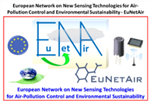 | European Network on New Sensing Technologies for Air-Pollution Control and Environmental Sustainability
EuNetAir
|
|
The main objective of the Action is to develop new sensing technologies for Air Quality Control at integrated and multidisciplinary scale by coordinated research on nanomaterials, sensor-systems, air-quality modelling and standardised methods for supporting environmental sustainability with a special focus on Small and Medium Enterprises.
ABSTRACT AND KEYWORDS
This Action will focus on a new detection paradigm based on sensing technologies at low cost for Air Quality Control (AQC) and set up an interdisciplinary top-level coordinated network to define innovative approaches in sensor nanomaterials, gas sensors and devices, wireless sensor-systems, distributed computing, methods, models, standards and protocols for environmental sustainability within the European Research Area (ERA). The state-of-the-art showed that research on innovative sensing technologies for AQC based on advanced chemical sensors and sensor-systems at low-cost, including functional materials and nanotechnologies for eco-sustainability applications, the outdoor/indoor environment control, olfactometry, air-quality modelling, chemical weather forecasting, and related standardisation methods is performed already at the international level, but still needs serious efforts for coordination to boost new sensing paradigms for research and innovation. Only a close multidisciplinary cooperation will ensure cleaner air in Europe and reduced negative effects on human health for future generations in smart cities, efficient management of green buildings at low CO2 emissions, and sustainable economic development. The objective of the Action is to create a cooperative network to explore new sensing technologies for low-cost air-pollution control through field studies and laboratory experiments to transfer the results into preventive real-time control practises and global sustainability for monitoring climate changes and outdoor/indoor energy efficiency. Establishment of such a European network, involving Non-COST key-experts, will enable EU to develop world capabilities in urban sensor technology based on cost-effective nanomaterials and contribute to form a critical mass of researchers suitable for cooperation in science and technology, including training and education, to coordinate outstanding R&D and promote innovation towards industry, and support policy-makers.
Keywords: sensor functional materials, nanomaterials and sensing nanostructures, gas sensors and
wireless sensor-systems with distributed computing, air quality control/monitoring and
environmental measurements/modelling, protocols and standardisation methods for environmental
sustainability and chemical weather forecasting.
Aim The aim of the Action is to form a European-wide science and technology knowledge platform by a
multidisciplinary coordinated network at international level on the new sensing technologies for Air
Quality Control including sensor nanomaterials, portable wireless sensor-systems and distributed
computing, air-quality modeling and chemical weather forecasting, standards, methods and
protocols for environmental measurements in order to advance R&D and innovation in the
European green-economy by strengthening the sustainable development in smart cities, outdoor airpollution
control and indoor energy efficiency in buildings and to foster the technology transfer of
the new sensing paradigm of the cost-effective chemical sensors in the European countries with a
special focus on SMEs.
Objectives With the participation of researchers and industry, as primary objective, the Action will develop a
transnational network of multidisciplinary expertise in AQC from COST and non-COST countries,
to investigate novel sensors and deployment technologies for environmental monitoring.
The main objectives of the Action are listed, but not limited to:
- to establish a Pan-European multidisciplinary R&D platform on new sensing paradigm for
AQC contributing to sustainable development, green-economy and social welfare;
- to create collaborative research teams in the ERA on the new sensing technologies for AQC in
an integrated approach to avoid fragmentation of the research efforts;
- to train early stage researchers (ESR) and new young scientists in the field for supporting
competitiveness of European industry by qualified human potential;
- to promote gender balance and involvement of ESR in AQC;
- to disseminate R&D results on AQC towards industry community and policy makers as well
as general public and high schools.
The secondary objectives, across the 4 Working Groups of the Action, are:
- to provide a platform between scientists in the field of materials, nanotechnology and sensorsystems
and other scientists such as environmental protection engineers, public agencies
managers, stakeholders, decision-makers, aiming to improve best practices in AQC and
explore the potential role of new generation of low-cost sensing devices;
- to investigate sensing mechanisms of functional nano-materials for gas measurement and
identification of the best available nano-materials, proving concepts and harmonising prestandardised
methods; based on available datasets from partners;
- to assess degradation rates and lifetime of sensor elements in defined environmental
conditions and evaluate interactions of sensitive materials with outdoor/indoor pollutants;
based on datasets from ongoing and historical field deployments of low cost sensors;
- to investigate the best available technology for sensor deployment, communication, power
supply and data storage, analysis and display;
- to monitor real-world environmental conditions with experimental campaigns to assess
composition of indoor air (buildings: house and office) and outdoor air (urban areas and
industrial sites) and to investigate how such data can be utilised in air pollution modelling;
- to approach standardisation of methods for air quality measurements e.g. harmonisation of
test procedures, chemical analyses, post processing, protocols etc.;
- to disseminate knowledge on functional materials and sensor-systems for AQC;
- to aid better focusing of Europe´s resources by coordinated efforts in AQC and environmental
sustainability to strengthen Europe´s competitiveness and scientific excellence improving
capacity building and networking to tackle global challenges in a big market in the mid-long
term.
| |
|
|